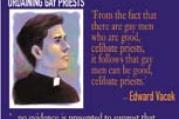Click here if you don’t see subscription options

“The Lord God will give him the throne of his father David” (Lk 1:32)

Difficult Questions
Regarding An Isolationist View of the International Criminal Court, by Brian Farrell (11/25): I am surprised that the editors would print such an unbalanced criticism of the Bush administration’s position with respect to the Rome Statute of the International Criminal Court of July 17, 1998.
The I.C.C. treaty was written at a conference attended by the Clinton administration. The United States voted against the treaty because provisions it sought were voted down. Quixotically, President Clinton both signed the treaty and said that his successor should not submit the treaty for Senate ratification in its present formfor good reasons.
The I.C.C. treaty extends worldwide jurisdiction over war crimes, crimes against humanity and the yet to be defined crime of aggression. Nationals of countries that do not ratify the treaty are, nevertheless, subject to the court. Countries that do ratify the treaty are obliged to surrender persons charged before the court found in their territories (which is why the United States sought an exemption from the Security Council for its peacekeeping forces dispatched to Bosnia and Herzegovina in July 2002).
The United States is now the world’s principal peacekeeper. American forces are being called upon to serve all over the world. American servicemen are subject to, and protected by, the Uniform Code of Military Justice, with final review by the United States Supreme Court. This would not be the case with the I.C.C., which will develop its own set of rules.
Because of international missions, American forces are more exposed to events of war than forces of any other country that is a party to the treaty. Most of the countries that have a vote in the treaty assembly equal to that of the United States are not as big as many of our cities and are unlikely to provide peacekeeping forces. The assembly will adopt procedures, elect judges and define what is meant by the amorphous term aggression. Many of the treaty countries do not share our understanding of criminal procedure or evidence, and many are not friendly to the United States. They, however, will elect the court and have a voice in the selection of, and the work of, the prosecutor.
The United States unsuccessfully asked at the treaty conference that at least at the outset, cases be sent to the court by the U.N. Security Council on a case by case basis. The United States did not know what the procedures would be, what investigative activity the prosecutor would undertake or who the judges would be.
There are other problems with the treaty, including the important question of whether it would be constitutional to subject Americans to a court not established under the United States Constitution.
Whether the United States should ratify the treaty is surely debatable, but any article about opposition should at least acknowledge the difficult questions involved.
William T. Hart





Church Blessed
The editorial on Ordaining Gay Men (11/11) does not want to come to grips with the fact that the overwhelming number of priestly sexual abuse cases that have come to light have been committed by gays. It does no one any good to pretend there isn’t a problem here. This does not, however, mean that the church hasn’t been blessed by many priests who are gay. No doubt it has.
The editorial struggles to say that it would be ill-advised to ban gays from the priesthood. Of course it would be, and for one very good reason: no sooner would the ban go into effect when we would learn that a great gay priest, who is celibate, got past the radar. What then? The scandal that would erupt by bouncing this priest would be nothing compared to what we’ve been going through all year.
The answer, then, is to screen more carefully so that immature men are not allowed to become priests.
William A. Donohue,



